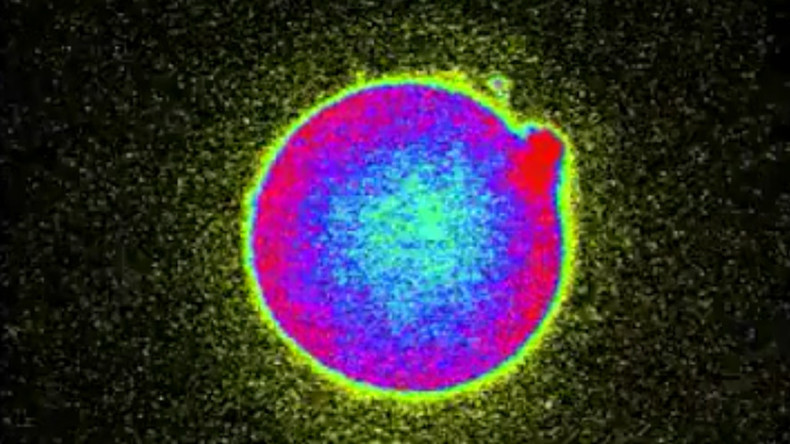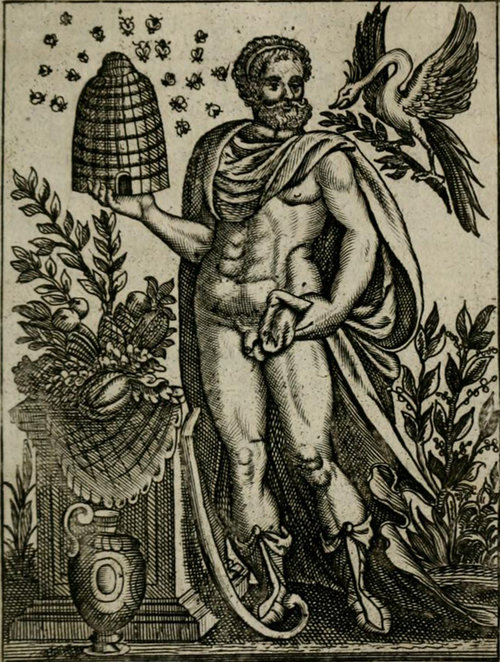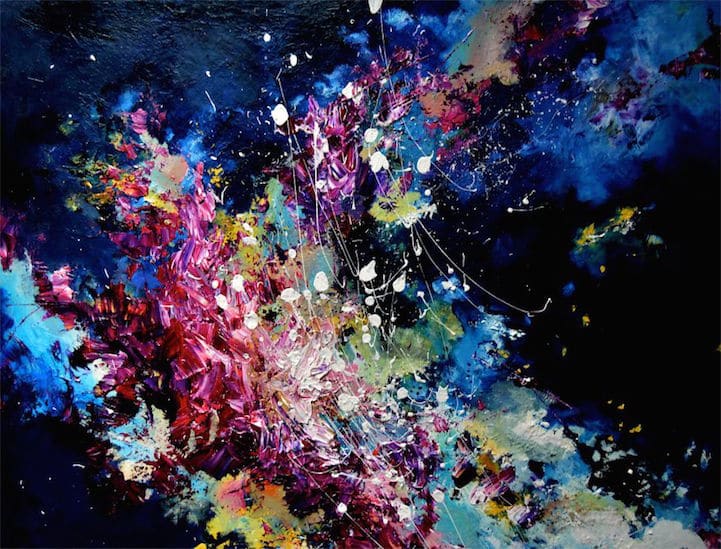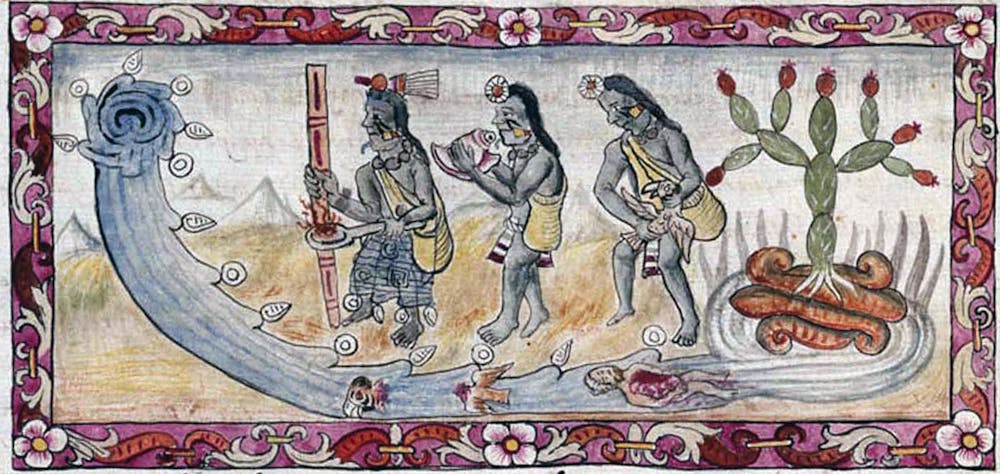
Excuse please no boast
only the glory of
celebrating
the processes
of Earth
and man.
-- The Maximus Poems, Charles Olson
Magma flow, glaciation, cellular mitosis, species extinction, tribal federations, the founding of cities, imperial overreach, the inscription of epics. Interpenetrating processes, differing in rate, rhythm and tone, converging on a single individual, a single town, a single planet. An intersection of geology and psychology on main street in a luminous flash of conception, then branching out, retreating down the back alleys.
Yet none of these sequences advancing blindly. Each possessing a sort of wisdom, a wariness, an archaic animation, a god in a mask. Bound by no moral code, they revel with Dionysus; haunted, intoxicated, tearing flesh, ripping limbs, naked in the sunlight; creeping vines, braying jungle cats, praising, overwhelmed. An ecstatic chorus older than the bedrock.
As the ancient song bubbled up opposite Regent’s Park Tube Station, still the earth seemed green and flowery; still, though it issued from so rude a mouth, a mere hole in the earth, muddy too, matted with root fibres and tangled grasses, still the old bubbling burbling song, soaking through the knotted roots of infinite ages, and skeletons and treasure, streamed away in rivulets over the pavement and all along the Marylebone Road, and down towards Euston, fertilising leaving a damp stain.
-- Mrs. Dalloway, Virginia Woolf

Music is the original expression of chthonic creation, all other arts extending from it. It plays and rills and riffs not in imitation of the Forms, but as immediate presentation of them, as if mocking their supposed primacy. Its courses flow through the elements; through media of water, flame, channels of sap and marrow, verse, cold architectures of steel and glass. Bubbling still -- right now -- in the imperial metropoles. A beggar woman, a hag perched on the fence pole, a creature of the street, takes up the chant; vessel of ALP, spring of the Goddess, the passing voice of life itself.
The universe is a continuous medley of mental processes, or a single huge mind with different levels of activity going on in it at once. As awareness descends through these levels, it produces ever more thoughts so that the lower reaches of the mind are noisy and full of chaotic and disharmonious impulses bound together only by the illusory chain of causality; as it reascends, it produces at each higher level fewer, less object-oriented and fragmented thoughts, up to the objectless contemplation of the One.
-- The Shape of Ancient Thought, Thomas McEvilley
And yet her song becomes distant, its tune indistinct, its words unclear, its listeners few. The song gets reduced to a concept. “Gets reduced,” but that is not how it was viewed by the wise of that era. Instead, it was “purified,” made transcendent, stripped of its contamination by the physical, the feminine, the animal, the non-intelligible, expression in time.

Crystalline, star-like abstraction. Mathematical purity, the suppression of dissonance, categories fixed, the notes unbending, a hierarchical gradation to absolute Spirit. A vast and austere beauty, eternal and perfect, free from the fluctuation and decomposition of phenomenon. All is a product of mind. The One is without objects, without any contact with Nature which at best is viewed as being an imperfect copy of Spirit, and at worst something wholly Evil.
Superficially seen, Plato was a playful dialectician, but deeply understood, he was an extremely religious man. In a certain sense, Platonic philosophy is in its essence a powerful synthesis of Greek shamanistic beliefs that have been systematized and spiritualized.
-- Out of This World, I.P. Couliano
Several steps separate the Dionysian from the Platonic, the shamanic being one of these. The Apollonian healers and seers, the iatromantis figures like Aristeaus and Abaris, translated or responded to general Dionysian ecstasy by shaping it into something individual and internal.
This course is reflected in Plato’s own life. Before becoming a disciple of Socrates, he was of a religious nature. He wrote tragic poetry which he burned after being initiated by his master, and later banished the poets from his ideal Republic. The archaic Dionysian, Orphic and shamanic musical vision of the unity of being/becoming was made intelligible, bound under the category of Reason.
And we may add that the Pseudo-Dionysius, whose works were the source of mediaeval Christian mysticism, and were held in great reverence by Thomas Aquinas, Tauler and Meister Eckhart, were copied from the order of the divine hierarchies as set forth by Plotinus, Jamblichus, and Proclus, who all, through Plato and Pythagoras, based themselves on Orpheus.
-- Orpheus, G.R.S. Mead

In this way, the original song of the Orphic book of nature was not entirely silenced. Its notes were transformed into text, its poetry had mostly become prosaic and rationalized, but its call could no more be stifled than starlight be extinguished. A mystical tradition persisted, at times meeting in secrecy and at times in open and honoured acceptance by the reigning religious and secular authorities. It largely ignored divisions of orthodoxy and heterodoxy, of religious and political affiliations. Mystics of all lands and creeds were united by vision.
There had been, within this broad tradition, a movement away from the total affirmation of the processes of life, a progress of emphasis on the embrace of Matter to the goal of the apprehension of pure Spirit, but certain seers (like Iamblichus/Jamblichus and others) were still able to catch glimpses of the primal ecstasy. Even in the writings of the most orthodox of these spiritual seekers, Thomas Aquinas most notably, the old inspired chorus can still be heard.
At times I even feel moved to address all future prophets of mankind as follows: “Prophets! Dear, kind prophets! Leave us alone. Do not try to fan the flames of lofty sentiments in our souls; do not try to make us better than we are. For so long as we are bad, we limit ourselves to petty felonies; as we grow better, we kill.
“Try to understand, dear prophets, that it is neither perfidy nor cunning nor vice that forces us to rage like vengeful animals; it is our inborn feelings of humanity and justice: without nobility of the soul we should never know righteous indignation. And try to understand that our souls work like swings: the stronger the push up towards the nobility of the soul, the stronger the swoop down towards the fury of the beast...”
-- Novel with Cocaine, M. Ageyev
The emphasis on spiritual purity and moral uprightness has taken its toll. Much of the nightmare of history during the last millennium emanates from fanatical responses to the words of the prophets of the pure: Nature has indeed fallen and with it the nature of man, but it can be made good and holy once more.
Crusades, inquisitions, witch hunts, religious wars, colonialism, genocide, racial supremacy, revolutionary reigns of terror, reactionary counter-suppression, totalitarian ideologies, scientific single vision, technological eschatology, commercial omnipresence all stem from the desire -- not wrong in itself -- for Truth without error and change, and for Spirit (however codified or designated) free of all impurity. But this leads to a split in the soul. What is whole is not necessarily perfect.

And so the soul swings, as it were, from nobility to the fury of that which is sub-bestial, monstrous, Satanic.
“...Up to now I have spoken only of local Satanic associations, but there are others, more extensive, which ravage the old world and the new, for Diabolism is quite up to date in one respect. It is highly centralized and very capably administered. There are committees, subcommittees, a sort of curia, which rules America and Europe, like the curia of a pope.
“The biggest of these societies founded as long ago as 1855 is the society of the Re-Theurgistes Optimates. Beneath an apparent unity it is divided into two camps, one aspiring to destroy the universe and reign over the ruins, the other thinking simply of imposing upon the world a demoniac cult of which it shall be high priest...”
-- Là-Bas, J.K. Huysmans
The satanic perfectly mirrors the orthodox. Both exist as highly centralized hierarchies, each held in thrall by their own dogma which divides the cosmos into categories of the accepted and the unaccepted. They are virtually indistinguishable.

Agents, double agents, triple and quadruple agents, flip back and forth across the border, employing identical methods and means, blurring the lines, provoking schisms, making words imprecise and ideas incoherent. Tradition and counter-tradition each calling the other black, a willingness on both sides to both conquer and destroy the world, each guilty of atrocity upon atrocity.
Was not everything, after all, like this bewildering woodland, this dance of dark and light? Everything only a glimpse always unforeseen, and always forgotten. For Gabriel Syme had found in the heart of the sun-splashed wood what many modern painters had found there. He had found the thing which the modern people call Impressionism, which is another name for the final scepticism which can find no floor to the universe.
-- The Man Who was Thursday, G.K. Chesterton
Chesterton’s perceptive novel tells the tale of an anarchist terrorist cell that is wholly infiltrated by and composed of police agents, each convinced that the others are genuine violent revolutionaries. All anarchist violence is really state violence, all state violence is really anarchist violence. Shadow and sunlight, evil and good, can no longer be separated. All comes into question.
There is only the impressionistic dance of light and darkness -- only a play or a mirage, without bottom or foundation, universal nausea. A sort of chaotic music returns, the maenads reassemble, but there is no acceptance of the frenzy. Most try not to listen, stuff their ears against the siren song, but a few -- mainly unstable, outcast -- begin to be caught up in the dance.
“Purpose of life is unknown, and hence way to be is hidden from the eyes of living critters. Who can say if perhaps the schizophrenics are not correct? Mister, they take a brave journey. They turn from mere things, which one may handle and turn to practical use; they turn inward to meaning. There, the black-night-without-bottom lies, the pit. Who can say if they will return? And if so, what will they be like, having glimpsed meaning? I admire them.”
-- Martian Time-Slip, Philip K. Dick
It makes sense that it would be the “mad” who would first make the plunge. They have the least to lose -- already shunned and sidelined by the civilization of light -- and they have made a commitment, or have been by circumstances forced, to rediscover meaning. This meaning can no longer be universal and consensual -- everyone has become a skeptic -- but instead is particular, fluctuating, ad hoc.
Here alone -- with the mad, the drug user, the ignored artist, the socially despised -- is there the willingness to dive into the abyss and to attempt to surface with some answers from among the confused kaleidoscope of worldviews. Most do not reemerge. They attempt a sort of shamanism, but with total lack of support from their society, their would-be tribe.
The song is rediscovered, though there is the lingering drive to make sense of it. Even for the schizophrenic a rational -- in their own eyes -- grid must be overlaid upon the tumult of nature. And in this attempt to make rational sense, to privilege the abstractions of mind over completed embodied and ensouled experience, they suffer, they drown.
The prima materia of poetic emotion is a synesthetic chaos. A confused mixture of diverse emotions is first felt painfully in the body, like a swarming of multiple lives trying to escape. It is usually that uncomfortable feeling that forces the poet to take up the pen, be it as a vague and imperious need to exteriorize himself or in a less coarse fashion.
-- “Clavicles for a Great Poetic Game,” René Damaul
But for the very few that accept this synesthetic chaos in its own terms, in Her own terms, they may be blessed with creative enchantment. True poetry springs from this well, human imagination is found again, but not in concepts or ideals, not in anything that can be limited to the intelligible, but in the senses and emotions, in swarming life and in physical touch and beauty.
The eternal shines in the particular, the timeless in time, and all within the riotous details of perception. We return to the processes of the Earth, and to the inner processes of imagining and perceiving, and the bonfires are lit again. Prose becomes poetry, poetry song, and song is coupled with dance.

good wording.
ReplyDeleteOne of the reasons the modern world has no great culture is because the sons of the rich have such bad conscience about not working, they all strive the same as others to climb on top of each other in normie jobs. Just fifty years ago most used to list “sportsman” as their main profession; that was in a recent time with slightly more beauty and more art. But…but…it is wrong to look at this aspect of life, because it assumes we have more familiarity with it than we do. It’s not just that we don’t “deserve” to have a higher culture, although it’s that as well, but that the purpose of such a thing is completely alien to us. From the point of view of real culture and refinement we’re as barbaric as the most obscure herd of the Khwarezm where the women scratch their pubes in public…we’re just more tame and insipid than they were. So when I mention leisure, don’t imagine I mean by it what you mean by it. It’s not just leisure, you don’t need just leisure for higher life, but specifically leisure for preparation for war. To escape the subjection of our time, you can’t really look to science or art any longer: you have forgotten their purpose. They’ve been defanged and almost all participation in these today amounts to a kind of cargo-cultism. Who can even think of a true scientist or artist among us? I think there is maybe a century since one existed. Just see how Cellini crafted his Perseus, in what frame of mind he was, and how foreign this is from our “artist” diddlers. Paglia says the artist is an obsessive, with a mind close to that of a stalker or serial killer, and she is right: look at monomania of Newton, or character of people like Balzac or Baudelaire. Violent Spergs and obsessives. Our diddlers are diddlers because they lack all intensity and all faith in themselves and what they do. They’re not even nihilists, they lack all conviction in nihilism too: they just lack intensity, they’re pissed dry.
ReplyDeletecould some of the dilemma be due to the lost/forgotten teachings about the real-ity of the immortal soul?
ReplyDeletefra p. 272 of *on What is*
"and That immortal soul thing
a surprise it is as the great shaman thoth has joined the party, by way of the river Eridanus, if only for a moment, as he is hear to sea (the goddess) Eris, and of course he is hoping for a dance. amygdala, that mystic, dream master, and artist, who also has a deep interest in the Fable of the simulation argument, is intent on asking the great shaman thoth if he can inform the interlocutors about possible proper (pp) training, for an absurdist, whom may (or June) want to play the part of the archetypal 'catcher in the rye' ..."
available from info@newfalcon.com or on the Amazon at:
https://www.amazon.com/What-Freedom-Enchantment-23-Acts/dp/1561845426/ref=sr_1_1?s=books&ie=UTF8&qid=1523487417&sr=1-1